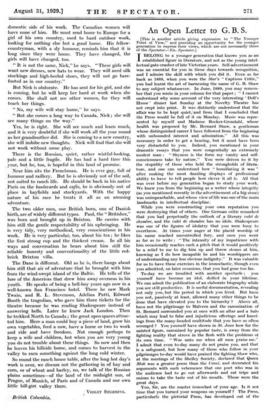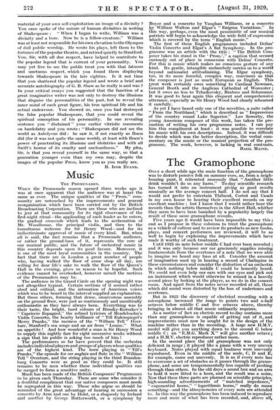An Open Letter to G. B. S.
[This is another article giving expression to "The Younger Point of View," and providing an opportunity for the younger generation to express their views, which are not necessarily those of the Spectator.—ED. SpedatOr.] 1 BELONG to a younger generation that knows you as an established figure in literature, and not as the young intel- lectual gate-crasher of late Victorian years. Self-advertisement was an .Nssential for you in those days towards recognition, and I admire the skill with which you did it. Even as far back as 1889, when you were the Star's "Captious Critic,"
you had learnt the art of harnessing the name of G. B. Shaw to any subject whatsoever. In June, 1889, you may remem- ber that you wrote in your column for that paper ; "I cannot understand why some account of the very interesting 'Doll's
House' dinner last Sunday at the Novelty Theatre has not crept into print. It was distinctly understood that the
affair was to be kept quiet,'And from that I concluded that the Press would be full of it on Monday. Music was repre- sented by myself and Madame Bocker-Grondahl, whose health was proposed by Mr. Bernard Shaw, a gentleman whose distinguished career I have followed from the beginning with unbounded interest and admiration." All this was necessary in order to get a hearing, but it must have been very distasteful to you. Indeed, you mentioned in your dramatic essays that you were congenitally an extremely modest man : "Shyness is the form my vanity and self- consciousness take by nature." You were driven to it by the stupidity of those who held the strongholds of litera- ture, and one can understand how ." humiliating it was" after making the most dazzling displays of professional ability to have to tell people how clever it all is. All that was over before my generation began to study your work.
We knew you from the beginning as a writer whose integrity (as you mentioned recently in the advertisement of a big store) was unimpeachable, and whose view of life was one of the main landmarks in intellectual discipline.
While you were constructing your own reputation you
were destroying that of others. One German critic remarked that you had perpetually the outlook of a literary valet de chambre, and the valet de chambre has no idols. Shakespeare was one of the figures of idolatry that you were busy to overthrow. At times your anger at the placid worship of
his name reached uncontrolled fury, and once you went as far as to write : "The intensity of my impatience with him occasionally reaches such a pitch that it would positively be a relief to me to dig him up and throw stones at him, knowing as I do how incapable he and his worshippers are of understanding any less obvious indignity." It was valuable for us to have these exercises in the iconoclastic, though even you admitted, on later occasions, that you had gone too far.
To-day we are troubled with another spectacle ; you yourself have become an idol, deified in your lifetime. We can admit the publication of an elaborate biography while you are still productive. It is useful documentation, revealing not only you, but the period in which you lived. But have you not, passively at least, allowed many other things to be done that have elevated you to the hierarchy ? Above all, have not the pilgrimage to Malvern and the canonization of St. Bernard surrounded you at once with an altar and a halo which may lead to false and injudicious offerings and kneel- ings from the many-headed multitude that you have so often
scourged ? You yourself have shown in St. Joan how far the sainted figure, canonized by popular taste, is away from the fighting reality that strove in the flesh with the problems of its own time. "Woe unto me when all men praise me."
I admit that even to-day many do not praise you, and that is a safeguard, but how many of those who follow in your pilgrimages to-day would have praised the fighting Shaw who, at the meetings of the Shelley Society, declared that Queen Mab was a greater poem than the Cenci, and decorated his arguments with such vehemence that one poet who was in
the audience had to go out afterwards and eat tripe and onions to take the taste out of his mouth. Those were the great days.
You, Sir, are the master iconoclast of your age. Is it not
time that you turned your weapons on yourself ? The Press, particularly the pictorial Press, has developed out of the material of your own self-exploitation an image of a divinity ? You once spoke of the nature of human divinities in writing of Shakespeare : "When I began to write, William was a divinity and a bore. Now he is a fellow-creature." William was at least not responsible for his own elevation to the Olympus of dull public worship. He wrote his plays, left them to the fortunes of the popular theatre, and retired quietly to Stratford. You, Sir, with all due respect, have helped to contribute to the popular legend that is current of your personality. You may yet live to see the public treat you with that fatuous and unctuous respect, which you found them displaying towards Shakespeare in the late eighties. Is it not time that you shattered the popular legend and wrote a brief and accurate autobiography of G. B. Shaw as he really is and was ? In your critical essays you suggested that the function of a great imaginative writer was not only to destroy the illusions that disguise the personalities of the past, but to reveal the inner mind of each great figure, his true spiritual life and his actual endeavour. You showed us, once you had destroyed the false popular Shakespeare, that you could reveal the spiritual conception of his personality. In one revealing sentence you " disdained " your earlier vitriolic comments on barclolatry and you wrote : "Shakespeare did not see the world as Autolycus did : he saw it, if not exactly as Ibsen did (for it was not quite the same world), at least with Ibsen's power of penetrating its illusions and idolatries and with all Swift's horror of its cruelty and uncleanliness." My plea, Sir, is that you reveal yourself in the same way, so that a generation younger even than my own may, despite the images of the popular Press, know you as you really are.
B. IFOR. EVANS.

































 Previous page
Previous page